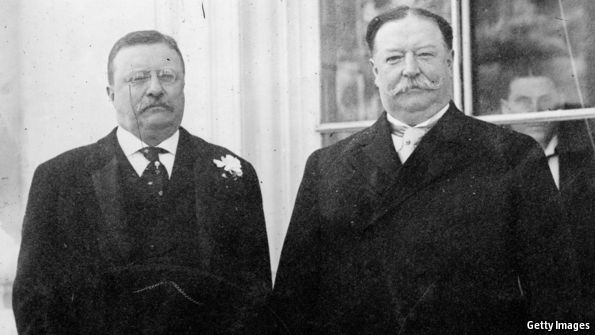2011.2.26
對於政治社會事業之興趣:我衣襟上戴Bull Moose(野鹿)徽章者兩月
今天重讀胡適的這則日記
他還有其他許多在留學時投入當地政治社會事業之記載
我覺得這是當日英美文科學生教育之優點 (徐志摩在英國時參與地方政治選舉等調查)
不過胡適更是有心人 不是書呆子
"吾對於政治社會事業之興趣(十一月九日) 余每居一地,輒視其地之政治社會事業如吾鄉吾邑 之政治社會事業。以故每逢其地有政治活動,社會改良之事,輒喜與聞之。不獨與聞之也,又將投身其中,研究其利害是非,自附於吾所以為近是之一派,與之同其 得失喜懼。故吾居綺色佳時,每有本城選舉,我輒有所附同,亦有所攻斥。於全國選舉亦然。一九一二年,我衣襟上戴Bull Moose(野鹿)徽章者兩月,以示主張進步黨也。去年則主張紐約女子參政權運動。今年則主張威氏之連任。 此種行為,人或嗤之,以為稚 氣。其實我頗以此自豪。蓋吾人所居,即是吾人之社會,其地之公益事業,皆足供吾人之研究。若不自認為此社會之一分子,決不能知其中人士之觀察點,即有所見 及,終是皮毛耳。若自認為其中之一人,以其人之事業利害,認為吾之事業利害,則觀察之點既同,觀察之結果自更親切矣。且此種閱歷,可養成一種留心公益事業 之習慣,今人身居一地,乃視其地之利害得失若不相關,則其人他日歸國,豈遽爾便能熱心於其一鄉一邑之利害得失乎?"
"很難說他是自由黨人還是保守黨人。或許他作為進步黨( 別名 Bull
這檔事胡適之先生教我的。
胡先生留美時美國的政壇:
Democracy in America
American politics
The 1912 overture
When Republicans went to war

THE ATTACK by Mitt Romney, the 2012 Republican presidential nominee, on Donald Trump, who looks likely to be the party's nominee in 2016, is not unprecedented. It has a parallel in the presidential election of 1912, when a split in the Republican party led the sitting president, William Howard Taft, to finish third in the polls. Taft ran foul of his predecessor, the energetic and volcanic Teddy Roosevelt, who ran on the Bull Moose ticket. The effect was to hand the presidency to Woodrow Wilson, the first Democrat to win office since 1892.
Roosevelt had regretted his rash vow not to run for a full third term in 1908 (he took office in 1901 after the assassination of William McKinley; this was before the passage of the 22nd amendment, which limited presidents to two full terms). While Taft was Roosevelt's hand-picked successor, and a long-term friend, the latter gradually became disillusioned with the Taft administration. Broadly speaking, Roosevelt was a populist, favouring higher tariffs and "trust-busting" attacks on big business; he was also a conservationist, setting up the national park system. Taft was more of a conventional, business-friendly conservative.
Taft's control of the Republican machine meant that he was able to deny Roosevelt the party nomination at the convention, amid disputes about the legitimacy of delegates. But Roosevelt was popular in the country and accepted the nomination of the reform-minded Progressive party. This was a fluid time in American politics; both William Jennings Bryan, who lost three times as a presidential candidate for the Democrats between 1896 and 1908, and Woodrow Wilson, had progressive leanings. The Republican party had its own progressive wing, featuring not just Roosevelt but Robert La Follette too. There was even a Socialist candidate, Eugene Debs, who picked up 6% of the vote.
Roosevelt performed better than any subsequent third party candidate has managed, finishing second, picking up 27.4% of the poll and 88 votes in the electoral college. (For comparison, Ross Perot got 18.9% but no electors in 1992; George Wallace claimed 45 electoral votes and 13.5% of the poll in 1968.) The long-term result of the 1912 election was to force progressives out of the Republicans and into the Democrats, eventually leading to the coalition led by Teddy's distant cousin, Franklin Roosevelt, in 1932. However, the Democrats retained their conservative, southern wing until civil rights legislation led white voters to increasingly back Republicans after 1968.
The parallels are not exact this time round. But it is possible to imagine that a convention fight might deny Mr Trump the Republican nomination in favour of a more acceptable candidate to the party's mainstream (John Kasich, or even, Mr Romney himself), That might prompt the disgruntled billionaire to set up his own third party run, in all probability handing the election to the Democrats.

沒有留言:
張貼留言